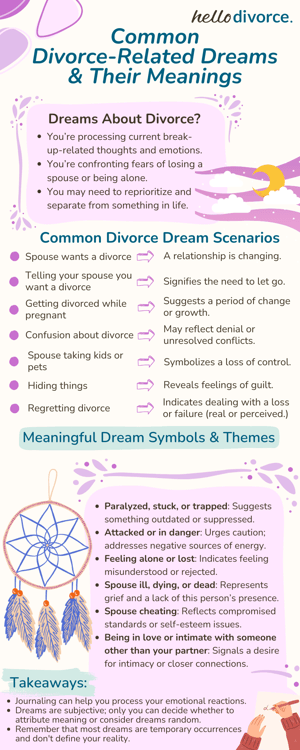Common Divorce-Related Dreams and What They Mean

- What do experts say about dreams?
- Is dream interpretation a legitimate tool in psychology?
- What does it mean if you dream about divorce?
- Divorce’s emotional toll: How it manifests in dreams
- How to interpret your dreams
- Common dreams about divorce and their meanings
- Meaningful dream symbols and themes during divorce
- Tips to cope with nightmares or trouble sleeping during divorce
- Mental health and sleep support resources
- References
Getting a restful night’s sleep while you’re going through or contemplating divorce can be challenging. You’re likely tossing and turning or having more vivid dreams than usual. Dreams or night terrors during divorce can add to your anxiety or be enlightening.
Perhaps you stumbled across this blog because you’ve been dreaming about divorce – but that might be disturbing if you are happy in your relationship or you are single. The truth is that dreams can be incredibly symbolic, revealing our deepest thoughts and feelings. Or, they can be random collections of memories and images that crept into our subconscious.
So, how do you know if your latest dreams are trying to tell you something or are just the result of perhaps a big meal or an intense TV show before bed? How can you interpret the symbols in your dreams and put that knowledge to good use? Read on to learn more about your dreams.
What do experts say about dreams?
Dreams have fascinated experts for thousands of years, with the first documentation of their formal study in ancient Mesopotamia, Egypt, Greece, and Rome. At this time, dreams were viewed as an art form that required intelligence to analyze and sometimes were considered divine inspiration or signals.
In modern times, Sigmond Freud and Carl Jung led the pack when it came to applying dream interpretation to psychological analysis. These and other experts in psychology, neuroscience, and anthropology offered insights into possible dream meanings and their potential significance.
Although there is a lot of disagreement, many dream experts agree on the following:
- Dreams reflect mental processes: Dreams illustrate our thoughts, emotions, memories, and deepest desires. Dreams often include elements from our daily experiences, anxieties, and unresolved issues.
- REM sleep: Most dreaming occurs during Rapid Eye Movement (REM) sleep when brain activity increases. REM sleep is critical for cognitive processing, memory recall, and emotional regulation.
- Symbolism and interpretation: The symbols in dreams can be powerful, and most experts agree on the general meaning behind common symbols and themes. They also agree that analyzing dreams may help individuals gain self-awareness.
- Processing emotions: Dreams can help people process their emotions, especially more difficult ones. Dreams often reflect one’s fears, hopes, and needs.
- Creative thinking: Dreams can be problem-solving tools. Dreaming can allow the brain to explore alternative scenarios and connect the dots.
- Cultural and personal influences: The dreamer’s cultural background, personal experiences, and other individual differences influence both the content and how they interpret it. In other words, a symbol can mean a lot to one person but nothing to others.
- Dream recall: Dream recall tends to be unreliable, even if you immediately wake up and write out what you remember. However, experts agree to note recurring themes or patterns.
- Clinical significance: Dreams can be valuable indicators of mental health and could also help determine underlying issues – but don’t stand alone to diagnose or fully explain anything.
Note: Definitive conclusions about dream meanings and purpose remain elusive across the research. Dreams are highly subjective, and their interpretation depends on numerous factors.
Is dream interpretation a legitimate tool in psychology?
When it comes to scientific use, dreams are usually seen as a unique way to explore the psyche rather than a concrete tool with proven insight. Dream interpretation can be a potentially helpful tool in therapy, but isn’t widely used in most forms of psychotherapy.
Many theories claim that dreaming mostly occurs during REM sleep cycles but has no meaning beyond a physiological phenomenon. These theories say that the content of your dreams is your brain trying to make sense of waking life.
A 2018 research study on dream theories by Tamara Fischmann & Marianne Leuzinger-Bohleber asserts: “Dreams have a central function for the ego in allowing for transforming previous memories into the present and current state of the self – they thus serve for the self to adapt itself to its changing environmental contexts without losing itself.”
In this context, dream interpretation may be a useful aid in the decision-making processes before, during, and after divorce. But, again, you cannot rely on dreams alone to understand your waking life and what steps you need to take moving forward.
What does it mean if you dream about divorce?
Like all divorce themes, dreaming about divorce might represent your current circumstances. If you’re thinking about or going through the divorce process, you are likely trying to process things as you sleep – so you dream about it. You might be trying to get part of the process done, or are having trouble understanding something and thus try to make sense of it in your dreams.
You might also be confronting a fear, either of losing your spouse or of staying in a marriage that isn’t working out. If you are single, you may simply be afraid of being left or alone. If you dream about your parents, family members, or other loved ones getting divorced, it may symbolize your fear of losing a source of support.
Leading online dream resource Dream Moods suggests that if you dream about divorce, you may need to access and reprioritize things in your life. You might need to separate from something that isn’t working in your life. That might not be your spouse – it could be someone else, a job, your living situation, or even a bad personal habit. It might also mean that you are not happy with a component of your relationship and should work on it, ideally by talking through it with your partner.
Divorce’s emotional toll: How it manifests in dreams
Divorce has a profound emotional impact, causing sadness, anger, grief, loneliness, guilt, anxiety, and uncertainty about the future. These emotions can manifest in dreams in various ways, reflecting the dreamer’s inner struggles, fears, and thought processes.
Here are some common ways the emotional impact of divorce can manifest in dreams:
- Loss and separation: Dreams about one’s ex or pre-break-up life are common. They reflect feelings of grief.
- Anxiety and fear: Many people going through divorce dream about the future, financial (in)stability, co-parenting, or starting over. Common scenarios revolve around failure, disagreement, abandonment, or being overwhelmed.
- Conflict and anger: Intense emotions around one’s unique circumstances manifest in dreams as confrontations, arguments, or violence. Usually, this is a way of processing these difficult emotions.
- Rejection or betrayal: The themes and symbols of these dreams may reflect one’s fears of betrayal, infidelity, abandonment, or feeling unloved.
- Rebuilding and empowerment: On the upside, people can dream about resilience, empowerment, and the process of rebuilding one's life post-divorce. These dreams feature themes of growth, independence, self-discovery, and new opportunities.
- Recurring dreams: Have a similar dream over and over? Recurring dreams reflect ongoing emotional processing and unresolved issues.
Note: Dream interpretation is highly subjective, but these dreams can serve as a tool for healing and emotional processing, especially when discussed with a trusted friend or as part of therapy.
How to interpret your dreams
Interpreting dreams can be fun and insightful. You might receive valuable information about your thoughts, emotions, and subconscious mind. Here's a step-by-step guide to interpret your dreams:
- Record the details ASAP: Keep a dream journal next to your bed or use an app to record your dreams as soon as you wake up. Record as many details as you can remember, including people, places, objects, actions, and any significant symbols or themes. You’ll also want to note how you feel in response to the dream.
- Identify symbols: Note any key symbols or elements that stand out. These could be prominent objects, animals, people, places, colors, emotions, or actions.
- Explore personal associations: Reflect on each dream symbol and consider the personal meanings attached to them. For example, a flying bird might symbolize your desire for independence. Note these associations.
- Consider context and emotions: Take note of the overall “story” of your dream, including the setting, themes, and emotions you experienced. Dreams often reflect your current emotional state, so consider how this might influence the dream's meaning.
- Look for patterns and recurring themes: Over time, you should start seeing patterns across your dreams. They can provide clues about recurring thoughts, emotions, or situations in your life.
- Reflect on life events: Consider recent events, experiences, or challenges in your waking life that might be influencing your dreams. It might be your subconscious trying to process what’s happening.
- Explore symbols and archetypes: Use dream dictionaries to gain a deeper understanding of their potential meanings (see some below). But ultimately, trust your intuition about dream meanings (or lack thereof).
- Consider your dream’s full story: Reflect on the narrative and sequence of events in your dream. Dreams often unfold like stories, with a beginning, middle, and end. Consider how each part of the dream contributes to its overall message or theme. Do you get “stuck” at one part, unable to move forward? Do you go back to sleep and pick back up at a certain part of the dream?
- Reflect on your emotions: Pay attention to the emotions you experienced during the dream and upon waking. A strong emotional response warrants deep thought into why, and what you might be able to do about it.
- Make use of your interpretation: Once you’ve done the steps above, consider how the dream's messages or insights might be able to positively guide your decisions, actions, relationships, and personal growth.
Remember that there's no one-size-fits-all approach to dream interpretation. Trust your intuition, be open-minded, and use dream analysis as a tool for self-reflection, self-discovery, and gaining deeper insights into your subconscious mind. If your dreams or sleep patterns are causing you distress, see our resources below for help.
Common dreams about divorce and their meanings
There are several common scenarios in dreams of divorce. Here are their possible meanings beyond simply processing your current circumstances, feelings, and desires.
- Your spouse or partner wants to divorce you or break up: You are moving into a new step or phase of your relationship. One of your relationships is changing.
- You tell your spouse you want a divorce: There is something you need or want to let go of.
- You are getting divorced while pregnant: Usually, this means a life change or period of growth and creativity. You are going in a new direction or want to pursue a new idea or goal. If there is trouble with the pregnancy, you may feel that a goal or idea is out of reach or that you have failed.
- You’re confused about if you are getting divorced: You may be in denial about some aspect of your divorce. Perhaps there is one conflict you are unable to reach an agreement about or something that seems nonsensical to you.
- Your spouse takes your kids or pets from you: Your childlike qualities are being scrutinized, or you feel a loss of innocence. You may be feeling overwhelmed by your responsibilities or that you lack control over your circumstances.
- You or your spouse are hiding things: Someone may be withholding information or being dishonest. This dream reveals feelings of guilt.
- You regret your divorce: Disappointments are consuming you. You need to work through overcoming a loss or failure (real or perceived).
Meaningful dream symbols and themes during divorce
If you’re getting a divorce or thinking about ending your marriage, you might dream about the following themes or symbols. Here are their possible interpretations beyond a literal translation of what a dream means.
- You are paralyzed, frozen, stuck, imprisoned, or trapped: Something is not fully developed or is outdated, or you feel rejected or suppressed.
- You are being attacked, hurt, or in danger: You need to be more cautious. It can also mean your negativity toward something or someone is preventing you from moving forward.
- You are alone, lost, or secluded: Feeling rejected or misunderstood.
- Your spouse is ill, dying, or dead: Grief or facing a loss. It can also mean that you feel you lack a personality trait or quality about this person that you admire. It usually means that you are feeling the lack of this person’s presence in your life.
- Your spouse is cheating on you: Compromised standards or morals are weighing on you. Your self-esteem has been damaged or you are feeling mistreated (it can also just stem from paranoia).
- You’re in love with or sexually intimate with someone other than your partner: You want to explore your sexuality or have closer connections with others. You long for intimacy or closer relationships.
Tips to cope with nightmares or trouble sleeping during divorce
Many people experience anxiety or intense emotions due to divorce-related dreams. Here are several actions and coping mechanisms that can help you.
- Keep a dream journal: As noted above, writing down your dreams can help you identify recurring themes, patterns, and emotions, providing valuable insights into your subconscious mind – helping you feel more in control.
- Practice relaxation techniques: Before sleep, try relaxation techniques such as deep breathing, meditation, yoga, or progressive muscle relaxation exercises to calm your mind and prepare your mind and body for rest.
- Seek professional support: Consider seeking help from a therapist, counselor, or other mental health professional who specializes in dream analysis or coping with divorce-related stress. You may also join a support group to connect with your peers.
- Challenge negative thoughts: Silence that inner critic. Practice cognitive-behavioral techniques to replace anxious thoughts with more positive and realistic perspectives.
- Engage in self-care: Make time for self-care activities each day that reduce stress. Some options are exercise, healthy eating, hobbies, talking to friends, time with pets, creative outlets, and spending time in nature.
- Set boundaries: Establish clear boundaries with your spouse or ex, and others who may be stressing you out. Communicate your needs calmly and clearly.
- Seek expert advice: If divorce-related issues are overwhelming, seek legal or other professional support (such as divorce attorneys, financial advisors, or mediators). Addressing practical concerns can alleviate some of the emotional weight on your shoulders.
Mental health and sleep support resources
If you or someone you know is experiencing mental health challenges related to your sleep, divorce, or any other issue, it's crucial to seek trustworthy support. Here are some reputable and accredited mental health resources that offer support, counseling, information, and guidance:
- National Alliance on Mental Illness: NAMI is a leading advocacy organization providing education, support groups, helplines, and resources for individuals and families affected by mental health conditions. Visit their website.
- CDC’s Tips for Better Sleep: If you’re having trouble sleeping, here are expert recommendations for proper sleep hygiene.
- Home Remedies to Help You Sleep: See the recommendations from Johns Hopkins Medicine.
- American Psychological Association: The APA offers a psychologist locator tool, self-help tools, and articles. Visit their website.
- National Institute of Mental Health: NIMH is a federal agency that conducts research on mental health disorders and provides information on various topics. Visit their website.
- Crisis Text Line: Get free, confidential crisis counseling via text message. Text HOME to 741741 to connect with a trained crisis counselor 24/7. Visit their website.
- Substance Abuse and Mental Health Services Administration: SAMHSA offers treatment locators and information on mental health and substance use disorders. Visit their website.
- Online therapy platforms: Online therapy platforms like Talkspace and BetterHelp connect individuals with licensed therapists via text, voice, or video messaging. Local mental health organizations: Check with local mental health organizations, clinics, or hospitals in your area for additional resources, support groups, counseling services, and referrals to accredited mental health professionals.
Conclusion
Almost all dreams are subjective. You can’t possibly clearly recall everything about them. It’s more about what you remember after it’s over and your emotional reactions. Your dreams only have power if you decide to give them meaning in your life.
Your dreams can empower you and help you process things happening in your life. Alternately, you might decide it’s all just random and means nothing in real life. It’s up to you. Sleep well and remember: this is temporary.
Do you need help understanding all of your options? Schedule a free 15-minute call with a member of our caring, experienced team today.
References
Fischmann, T., Leuzinger-Bohleber, M. (2018). Dreams. In: Boeker, H., Hartwich, P., Northoff, G. (eds) Neuropsychodynamic Psychiatry. Springer, Cham.
Hughes, J. D. (2000). Dream interpretation in ancient civilizations. Dreaming, 10(1), 7–18.
“Natural Sleep Aids: Home Remedies to Help You Sleep.” Johns Hopkins Medicine.
Pesant, Nicholas and Antonio Zadra. Working with dreams in therapy: What do we know and what should we do? (2004). Clinical Psychology Review (Volume 24, Issue 5).
Revonsuo A. The reinterpretation of dreams: An evolutionary hypothesis of the function of dreaming. Behavioral and Brain Sciences. 2000;23(6):877-901.
“The Psychology of Dreams: Inside the Dream Mind.” (2016). Brescia University.
“What Do Dreams Mean?” ClevelandClinic.org.



